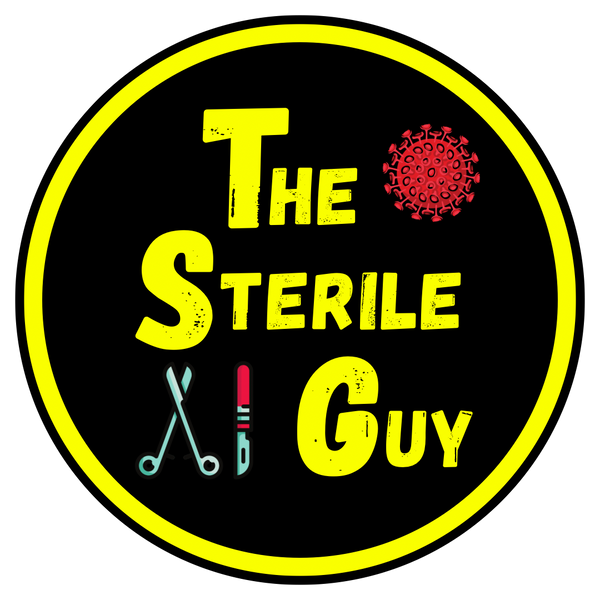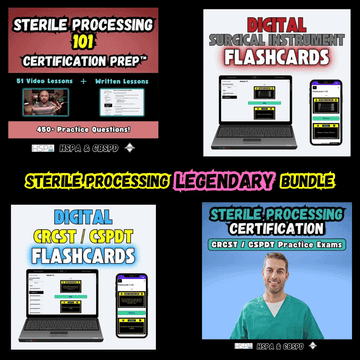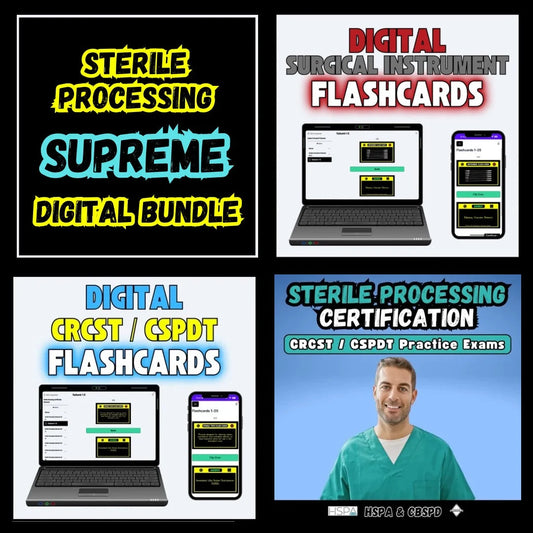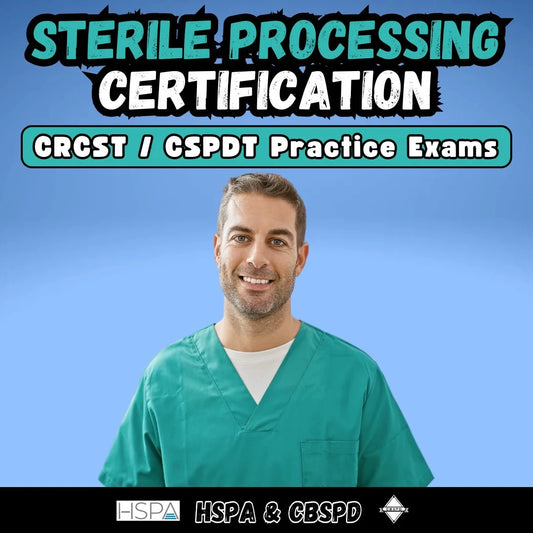How to Become a Sterile Processing Technician

Sterile Processing Technicians are critical contributors to healthcare, ensuring surgical instruments and medical devices are properly sterilized to safeguard patients. These professionals, often referred to as Certified Registered Central Service Technicians, sterilization technicians, medical equipment preparers, or Sterile Processing and Distribution Technicians, collaborate closely with surgical teams and other healthcare staff. Their success relies on a diverse set of skills, including attention to detail, problem-solving abilities, and foundational healthcare training like CPR and basic life support. Here's a deeper look into the role and training of Sterile Processing Technicians through the Sterile Processing 101 Certification Prep Course.
Job Responsibilities
Sterile Processing Technicians handle a wide array of tasks, including:
- Cleaning and sterilizing surgical equipment to remove contaminants before, during, and after procedures.
- Preparing and organizing surgical tools for healthcare teams.
- Providing sterile gowns, gloves, and other protective gear to surgical staff.
- Inspecting medical equipment to ensure compliance with strict hygiene standards.
- Identifying potential pathogens and assessing contamination risks.
- Scheduling repairs for damaged equipment.
- Transporting, storing, and disposing of medical instruments and waste safely.
- Keeping meticulous records of sterilization procedures.

Work Environment
These technicians typically work in sterile processing departments across various healthcare settings, such as:
- General and specialty hospitals
- Ambulatory surgical centers
- Dental and outpatient care facilities
- Medical laboratories
- Physicians' offices
- Pharmaceutical companies
- Birth centers and endoscopy offices
- Medical device manufacturing facilities
Schedules vary based on the employer. Hospital-based technicians may have rotating shifts, including nights and weekends, while private facilities often offer more consistent hours. The job can be physically demanding, requiring technicians to stand for long periods, lift heavy objects, and handle exposure to hazardous materials. Following workplace safety protocols minimizes these risks.

Education and Training
To become a Sterile Processing Technician, you typically need a high school diploma or equivalent, followed by specialized training. The Sterile Processing 101 Certification Prep Course provides comprehensive education in this field, and expertly prepares you for certification.
Program Duration
The course is accessible for up to 6 months, and is run at your own pace. For instance, the Sterile Processing 101 Certification Prep Course can be completed in as little as two months.
Core Topics
Training course covers key areas such as:
- Sterile processing design & workflow
- Microbiology and infection control
- Sterilization and decontamination techniques
- Medical instrument identification and preparation
- Inventory management and record-keeping
- Healthcare system fundamentals
Certification
While certification isn't always mandatory, it significantly improves job prospects. Two main certifications are:
- Certified Registered Central Service Technician (CRCST): Offered by the Healthcare Sterile Processing Association (HSPA). Full certification requires passing an exam and completing 400 hours of experience. Whereas the Provisional CRCST does not require the 400 hours of hands on experience.
- Certified Sterile Processing and Distribution Technician (CSPDT): Provided by the Certification Board for Sterile Processing and Distribution (CBSPD), with eligibility based on education or relevant work experience.
Both certifications require periodic renewal through continuing education credits.
Career Outlook and Advancement
The demand for sterile processing technicians is expected to grow by 6% annually through 2033, faster than the average for all occupations. This growth equates to about 4,000 new job openings per year. Opportunities for career advancement include roles like Sterile Processing Manager or surgical technologist, often requiring additional education and certification.
Conclusion
Becoming a Sterile Processing Technician is a rewarding way to enter the healthcare field and contribute to patient safety. With training programs like the Sterile Processing 101 Certification Prep Course, aspiring technicians can start a fulfilling career in as little as a couple months. Take the next step today and explore the possibilities this vital role offers.

Share
Let customers speak for us
from 254 reviewsUsed the practice questions and passed my sterile processing certification easy!
I literally took my test twice and wasn’t able to pass I almost gave up but I said let me try out this guy that all
The techs been telling me course , and I passed finally !! I would definitely recommend this course.
I really enjoy studying on the Sterile Guy page, all the information that is available on here is Fantastic! Waiting to get my test date and when I do I’ll be back to let you know how well this site is!! Thanks
Thank you sterile guy!I saw some of your questions on the exam.Definitely a huge help
Easy to understand and helpful to prepare CRCST Test.
Wish I had found this sooner !!! You know your stuff!!! I commend you for your hard work and dedication! This is the best study tools I’ve ever had. Thank you sterile guy! Much love from your fellow CER and CRCST and CIS tech
I took the practice test and I got a 91% on my certification exam!!
This course was the extra boost that I needed in order be confident in passing the exam. Thank you for all the information provided. I even refer to your notes while working.
Very helpful to me I can study any where at my own pace and low cost than going to school...I'm glad that there is something like this online to help anyone who want to pursue their career as a sterile processing tech.
I loved it, it’s very informative and the questions are great, it’s a great resource to purchase if you want to prepare for your certification exam!
I’ve really enjoyed this course so far. It delivers the information in a straightforward, digestible way. The Sterile Guy has compiled a highly effective program. Thanks very much from one highly satisfied customer!
The practice exams are detailed and easy to navigate. Brandon continues to show his passion in this industry by sharing his knowledge with up-and-coming techs. I also recommend investing in his flashcards. It has helped me greatly. Thank you, Brandon!,
These practice quizzes really helped me get the hang of answering questions related to instruments and the processes of preparing them! I even bought them twice cause I ran out of time lol. Super helpful!








